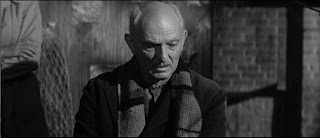I planned on putting this up after Hallowe'en, anyway—a way of lighting a candle in the darkness. But, after the last couple weeks, I found it imperative to put this up, now more than ever.
The Story: The economy of the images is key.
Director George Stevens had made his mark with light comedies and period dramas before World War II. Entertainments. Afterwards, his films changed. They became more formal and mannered. Thought out and psychological. Contemplations on good and evil and how they affect and shape our lives. Diverse in subject matter—A Place in the Sun, Shane, Giant—they all seemed to beg the question: how did we get there? How could human beings turn so evil, capable of such accomplishments and yet capable of atrocities, as well.
The Diary of Anne Frank was his direct statement on that war, which he'd covered as a member of the U.S. Army Signal Corps, where he'd photographed the Normandy invasion, the German surrender, and the opening of the Dachau concentration camp. Given such assignments, how could one not come away changed?
But, look at these images, very, very carefully composed and spare in their effects: the last carefully composed shot of the cast awaiting their moment of discovery; the haunting shot of Anne, prefiguring her short life in the camps, looking ghost-like and moving away, seemingly on the same breeze the ruffles the pages of her diary; the stark image of the broken window with its limited field of sky, a mocking glimpse of freedom; looking back through that window as Otto Frank tells his story; the disquieting edit to his close-up that begins with him staring out that window, then at us, as if accusing, before he returns to his story; the final, processed shot (courtesy of L.B. Abbott) of seagulls cast against a sky...like crying souls.
I think about this scene and movie—a lot—especially when dealing with the public. Yes, there is evil in the world, and given the opportunity, people can sink to their lowest level. But, for the most part... For the most part....
She puts me to shame, too.
The Set Up: After years of hiding in Nazi-occupied Amsterdam, the collection of Jews, including the Frank family, have been discovered. Otto Frank, the only one surviving, returns to the scene...where he has been given something left behind—his daughter Anne's diary.
Action.
ANNE (VO): And so it seems our stay here is over. They've given us just a moment to get our things.
ANNE (VO): We can each take a bag...and whatever it will hold of clothing.
ANNE (VO): Nothing else.
ANNE (VO): So, dear diary...that means I must leave you behind.
ANNE (VO): Good-bye for awhile. P.S. Please, please, anyone, if you should find this diary...will you please keep it safe for me. Because someday I hope that—FRANK: No more.
MIEP: I had gone to the country to try and find food. When I got back the police were in the building.
KRALER: We made it our business to learn how they knew. It was the thief who told them.
KRALER: We know the thief. He was...
FRANK: It seems strange to me now. But we were so full of hope in the camp in Holland where they first took us. The news of the war was good. The British and Americans were sweeping through France. We felt sure they would get to us in time to--
FRANK: But--
FRANK: In September we were shipped to Poland. The men to one camp. The women to another. From there, they were sent to Belsen. I stayed in Auschwitz. In January, we were freed, the few of us who were left.
FRANK: The war was not yet over, no. It took us a long time to get home. Each time the train would stop, we'd all get out, you know, at a siding or a crossing, and...walk from group to group.
FRANK: "Where were you?""Were you at Belsen?" "At Buchenwald?" "At Mauthausen? Where?FRANK: "Is it possible that you ever knew my wife? Did you ever see my husband, my son?" "My daughter?"
FRANK: That's how I found out about my wife's death...Margot's, Van Daans, Peter, Dussel.
FRANK: But...
FRANK: Anne...
FRANK: I still hoped.
FRANK: Yesterday I was in Rotterdam. I met a woman there. She'd been in Belsen...with Anne.
FRANK: I know now.ANNE (VO): In spite of everything, I still believe that people are really good at heart.
FRANK: She puts me to shame.
The Diary of Anne Frank
Words by Frances Goodrich and Albert Hackett (and Anne Frank)
Pictures by William C. Mellor, Jack Cardiff, L.B. Abbott, and George Stevens
The Diary of Anne Frank is available on DVD from Twentieth Century Fox Home Entertainment.





































No comments:
Post a Comment